Medical expert of the article
New publications
Preparations
Alcohol poisoning pills
Last reviewed: 04.07.2025

All iLive content is medically reviewed or fact checked to ensure as much factual accuracy as possible.
We have strict sourcing guidelines and only link to reputable media sites, academic research institutions and, whenever possible, medically peer reviewed studies. Note that the numbers in parentheses ([1], [2], etc.) are clickable links to these studies.
If you feel that any of our content is inaccurate, out-of-date, or otherwise questionable, please select it and press Ctrl + Enter.
First, let's clarify what alcohol poisoning is and why it is necessary to take pills for alcohol poisoning.
Excessive doses of alcohol consumed have a detrimental effect on the human body. The process of ethyl breakdown predetermines a strong toxic load on the functional activity of internal organs. In other words, the person has been poisoned by alcohol.
The consequence of this intoxication is a hangover syndrome. A hangover occurs when the body cannot quickly get rid of the toxic substances that have entered. To get out of this state, you need to help the body utilize the toxins. In this situation, alcohol poisoning pills will help, divided into 2 groups. The first type includes adsorbent medications. The second type includes symptomatic medications.
It should be noted that it is better to take adsorbents approximately 1 hour before drinking alcoholic beverages. This is due to the fact that ethanol is absorbed into the blood quite quickly. For this reason, the sorbent does not have time to perform its therapeutic mission. It would be more appropriate to classify these medications as preventive.
Symptomatic medications are aimed at relieving the adverse symptoms of hangover syndrome. They also significantly reduce the negative impact of a hangover on the patient's well-being.
Indications alcohol poisoning pills
- Thirst.
- Headache.
- Irritability.
- Nausea, vomiting.
- Diarrhea.
- Dizziness.
- Increased sweating.
- Increased heart rate.
- Chills.
- General weakness.
- Unpleasant sensations in the oral cavity.
Release form
Names of tablets for alcohol poisoning of the adsorbent group
 [ 1 ]
[ 1 ]
Activated carbon
Pharmacodynamics:
Specially processed coal of plant or animal origin. Has high surface activity. Has the ability to absorb (adsorb) harmful substances (toxins), gases, as well as salts of heavy metals, synthetic and natural alkaloids, sleeping pills, poisons, phenol derivatives, glycosides, hydrocyanic acid, etc.
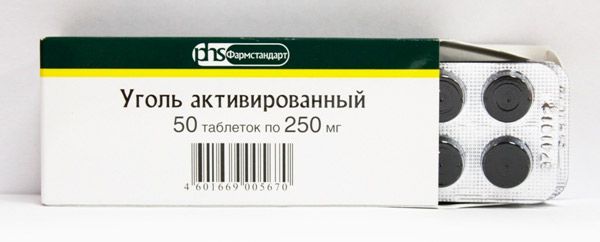
Indications for the use of activated carbon:
- Intoxication manifested in the form of dyspepsia, flatulence (bloating), diarrhea, heartburn.
- Exacerbation of allergic diseases of various etiologies.
- Diseases of the digestive organs of infectious origin (dysentery, salmonellosis).
- Poisoning by medications, poor quality food and toxic metals.
- Hepatitis.
- Intoxication caused by psychotropic or narcotic substances, as well as alcoholic substances.
Directions for use and dosage:
For any poisoning, 25 g of activated carbon is prescribed as a suspension (crush the tablets and stir in boiled water at room temperature). A similar suspension is used in the gastric lavage procedure. In addition, for poisoning, a mixture is prescribed in the following proportion: 2 parts activated carbon, 1 part magnesium oxide and 1 part tannin (2 tablespoons per glass of water). If flatulence or heartburn occurs, 2 g of activated carbon is taken, stirred in warm water.
Side effects when used:
Taking activated carbon can cause diarrhea or constipation, development of a lack of fats, vitamins and proteins. Due to its adsorbing properties, this drug reduces the effectiveness of other medications.
Contraindications for use of the drug:
The use of activated carbon is not recommended for ulcerative lesions of the digestive organs.
Storage conditions:
Store in a dry place, away from products that emit vapors and gases.
 [ 2 ]
[ 2 ]
Polysorb
Pharmacodynamics:
Has adsorbent properties. Binds and removes endogenous or exogenous toxins, allergens (bacterial and food) from organs. As well as highly toxic substances formed as a result of protein breakdown in the intestinal organs. Promotes the transport of toxic substances into the intestine from the lymph and blood.
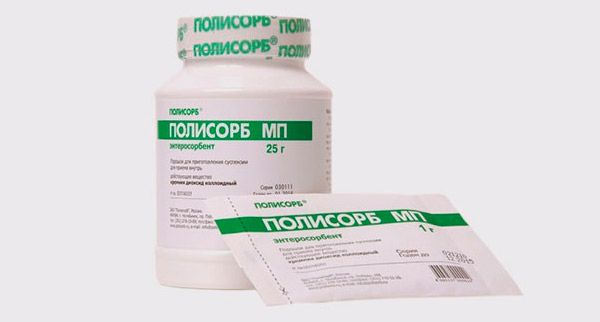
The following are indications for which Polysorb is used:
- Infectious intestinal diseases (salmonellosis, escherichiosis, other foodborne infections).
- Hepatitis of viral origin.
- Various poisonings (including alcohol intoxication).
Methods of administration and dosage:
Polysorb is taken orally in the form of a suspension. The suspension is prepared as follows: 1 tablespoon of powder (1.2 g) is mixed in 1 glass of boiled water. Take one hour before meals and medications. The daily dose is about 12 g. In case of exacerbation, the dose is increased to 24 g (divided into 4-5 doses). About 7 g of the drug can be taken at one time.
Contraindications:
- Should not be administered to children under one year of age.
- The presence of ulcerative and erosive lesions of the intestinal mucosa.
- Ulcer diseases during exacerbation.
- Contraindicated in case of individual intolerance to the medication.
- Pregnancy.
Interactions with other substances:
When taken simultaneously with acetylsalicylic acid (aspirin), the process of microelement breakdown increases. Also, when using Polysorb, the pharmacodynamic properties of nicotinic acid are enhanced.
Storage conditions:
Store in sealed bottles. The room temperature should not exceed 25 degrees Celsius. Keep out of reach of children.
Shelf life:
Dry powder is stored for up to 3 years. The prepared suspension can be used within 24 hours. The temperature should be approximately 10-15 degrees Celsius.
Carbolong
Karbolong is produced in powder form of activated carbon obtained from fruit seeds. It has high sorbent properties.
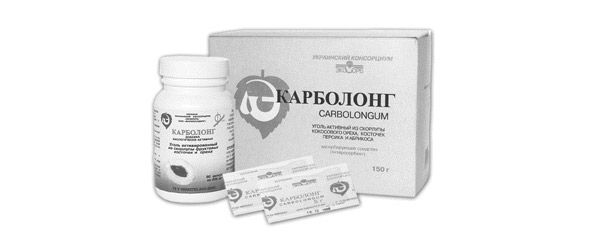
Method and dosage of application:
Karbolong is used 5-8g per dose 3 times a day. It is advisable to take it for 2 to 15 days. It is used orally as a mixture of powder and water. You can also use dry powder (wash down with a glass of water).
Names of pills for alcohol poisoning of the symptomatic group
Zorex
Pharmacodynamics:
It has high detoxifying, antioxidant and hepatoprotective properties. The main active substances that are part of the structure of Zorex are unithiol and calcium pantothenate. As a result of the interaction of unithiol and ethanol breakdown products (other poisons), non-toxic complexes are formed, which the body gets rid of with urine. The presence of calcium pantothenate helps to increase the effectiveness of the detoxifying effect of Zorex.
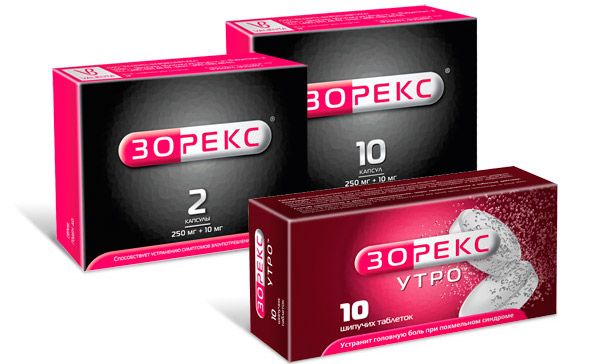
Pharmacokinetics:
As a result of taking this medicine, its highest concentration in the body occurs after one and a half hours. The maximum concentration of Zorex in plasma is maintained for approximately 9 hours. The duration of stay in the digestive organs is several minutes (20-25). The time required for the breakdown of ethanol and other toxins is about 8 hours. An average of 55% of the drug is excreted from the body with urine, the rest is excreted with feces.
When is ZOREX indicated:
- Alcoholism in the chronic stage.
- Acute poisoning with alcoholic beverages.
- Poisoning caused by drugs from the group of cardiac glycosides.
- Intoxication with toxic metals.
Methods of administration, dosage:
Taken before meals.
For the treatment of alcoholism: take 1 capsule 2 times a day (duration of treatment is 10 days).
For the treatment of acute alcohol poisoning: a similar dosage is prescribed - 1 capsule 2 times a day. In case of exacerbation, the dosage can be increased: 1 capsule 3 times a day. The duration of the course of therapy is several days (until the symptoms of poisoning disappear).
When treating poisoning with toxic metals and arsenic compounds, the daily dose is increased: 350-1000 mg divided into 3 doses. It must be taken for at least 7 days.
Side effects:
In cases of taking increased doses, the following symptoms may be observed: increased heart rate, nausea, weakness. Also, skin reactions of the allergic type may very rarely develop.
Contraindications for use:
It is not recommended to take if the patient is hypersensitive to this drug. Also, the use of Zorex is contraindicated if a person suffers from diseases associated with kidney and liver dysfunction.
Drug overdoses:
Exceeding the dose several times (10 or more) can lead to convulsions, shortness of breath, a feeling of inhibition and lethargy. In this case, it is necessary to wash the stomach, take a laxative and activated carbon.
Interaction of Zorex with other drugs:
The simultaneous use of Zorex with agents that contain toxic metals and alkalis leads to an increase in the rate of drug breakdown.
Storage conditions:
Zorex should be stored in a dark place, protected from moisture. The temperature should not exceed 25 degrees Celsius. Children's access to the storage area should be restricted.
Biotredin
Refers to combined drugs. Biotredin consists of L-threonine and vitamin B6 (pyridoxine hydrochloride). This drug increases mental activity, normalizes the metabolic process. Helps relieve symptoms of acute alcohol poisoning and chronic alcohol dependence.
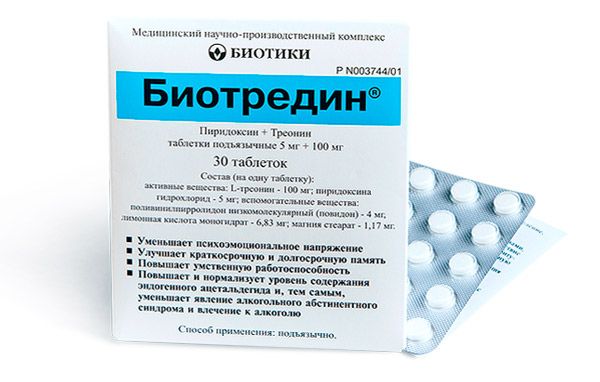
Indications for use:
- It is used to treat alcoholism in the chronic stage.
- Constant craving for alcohol.
- A condition that occurs as a result of abruptly stopping alcohol consumption (withdrawal syndrome).
- Decreased mental capacity.
Directions for use and dosage:
To neutralize the craving for alcohol, 0.1-0.3 g of Biotredin is prescribed per dose. Take 4 times a day (5-7 days). The course of treatment can be repeated several times (7-10) per year.
To relieve alcohol withdrawal syndrome, up to 4 tablets 4 times a day may be prescribed. In subsequent days of therapy, the dose is reduced to 2 tablets 3 times a day. Take for at least 1 month.
Contraindications for use:
Biotredin is not recommended for use while intoxicated, as it significantly reduces the therapeutic effectiveness of the drug.
 [ 3 ]
[ 3 ]
Limontar
Pharmacodynamics:
The complex medicinal product Limontar consists of citric and succinic acids.
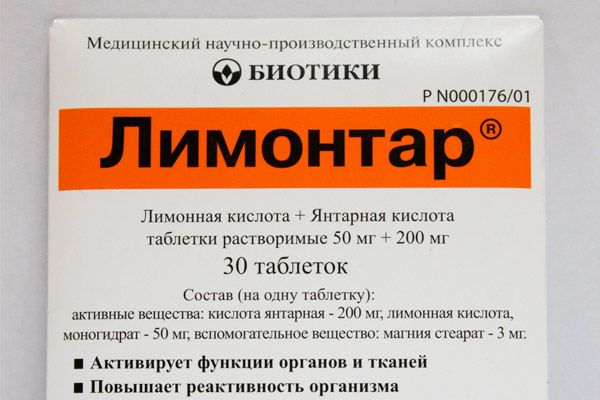
Promotes normalization of metabolic processes in body tissues. Has high antioxidant activity. Stimulates secretion of hydrochloric acid in the stomach, improves appetite. Relieves symptoms of alcohol poisoning, increases overall performance of the body.
It is used for the prevention of alcohol intoxication. And also for withdrawal from binge drinking in chronic alcoholism.
Methods of application and dosage:
- Limontar is intended for internal use. It is used in the form of a suspension with water or juice.
- For preventive purposes, take 0.25 g of the drug 1 hour before drinking alcohol.
- In case of acute alcohol intoxication, 0.25 g is used (4 doses) every 2 hours.
- When recovering from a binge drinking state, Limontar (0.25 g) is taken 4 times a day for 5 to 10 days.
- It should be noted that when this drug is used simultaneously with tranquilizers or barbiturates, the pharmacological effect of the latter is reduced.
Side effect:
When taking Limontar, signs of increased blood pressure may occur: tinnitus, dizziness, headache in the back of the head. And also the appearance of painful sensations in the stomach area.
The drug should be stored in a dark, dry place.
Yantavit
Pharmacological action:
The basis of the composition of the biologically active supplement Yantavit is succinic acid, which has high adaptogenic properties. The action of Yantavit is aimed at strengthening the protective functions of the body, normalizing all metabolic processes, has an antihypoxic regenerative effect, and also improves the functioning of all organs and systems in cases of exposure to unfavorable factors.

Indications for use:
- Stressful state.
- Physical or mental fatigue.
- The period of treatment and rehabilitation of serious diseases.
- Acute poisoning with toxic elements, including alcohol).
- Relieving hangover symptoms.
How to use and dosage:
For adults, the optimal daily dose is 1.0 g of the drug. Yantavit should be taken 1 tablet 2 times a day - in the morning and in the afternoon (during meals). It is not recommended to take it in the evening, as Yantavit has a tonic effect on the body. The course of treatment should last at least 1 month. In the middle of the course of therapy (after 2 weeks), a break of 3 days should be taken. For good results, the course of treatment should be repeated every 3 months.
Metadoxil
Phrmacodynamics:
It has a high detoxifying and hepatoprotective effect.
Activates the liver enzymes alcohol dehydrogenase and acetaldehyde dehydrogenase, which are involved in the metabolism of ethanol, which leads to an acceleration of the process of elimination of ethanol and acetaldehyde.
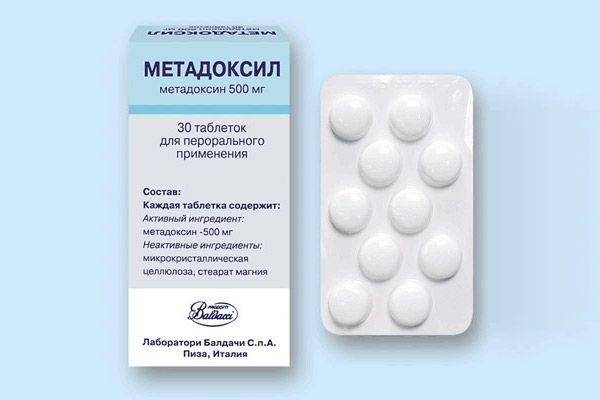
Slows down the development of liver cirrhosis due to inhibition of fibronectin and collagen synthesis. Improves thinking and memory, reduces the risk of developing depressive disorders.
It is used in the treatment of alcoholism in acute and chronic stages. Also during the course of treatment of liver diseases caused by long-term exposure of hepatocytes to toxins.
Pharmacological release form: tablets, ampoules.
Methods of administration: single oral administration (1 to 2 tablets), intravenous or intramuscular (1-2 ampoules of 0.5 ml).
Contraindications for use:
Pregnancy, Parkinson's disease, hypersensitivity to the drug.
Glycine
Pharmacological action:
Glycine calms the nervous system, improves mood and removes depression. Stimulates mental abilities and improves sleep quality. Increases antitoxic activity in drug poisoning, as well as in alcohol poisoning.
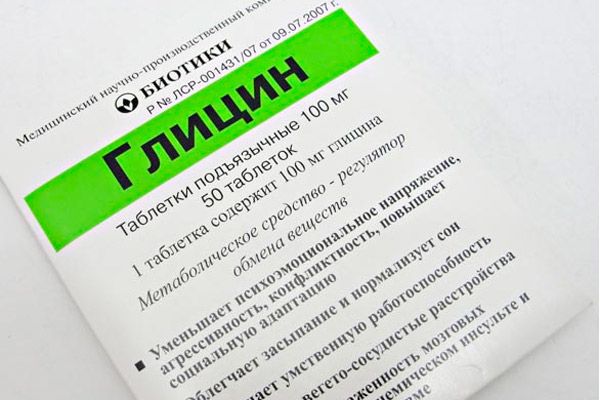
Indications for use:
- Malaise and increased fatigue.
- Sleep disturbances caused by increased nervous excitability.
- Nervous disorders (also those caused by long-term exposure to alcohol).
- Nervousness as a result of stressful situations.
- Consequences of TBI.
What are the methods of application and dosage:
Glycine in tablet form is taken under the tongue (sublingually) or behind the cheek (transbuccally) 1 tablet 3 times a day. The duration of the treatment course is at least 1 month. When treating diseases associated with alcohol addiction, the course of treatment is periodically repeated.
It is contraindicated to take glycine for children under 2 years of age, patients with low blood pressure and people who are hypersensitive to this drug.
Names of pills for nausea due to alcohol poisoning
Anesthesin
It has a local anesthetic pharmacological effect.

Indications for which use is prescribed:
- Spasmodic pain in the stomach area.
- Nausea caused by alcohol poisoning.
- Redness and itching of the skin.
Methods of use and dosage:
For internal use, anesthesin is used in the form of powder and tablets. For stomach pain or nausea, 0.3 g of the drug is prescribed with a frequency of use 4 times a day. To relieve unpleasant symptoms of skin diseases, ointments and powders (5-10%) are used for external use.
Anesthesin is contraindicated in cases of increased hypersensitivity to the drug.
Validol
This drug has a calming effect on the nervous system, as well as a reflex vasodilatory effect on blood vessels. Due to the presence of menthol, it reduces the likelihood of developing a gag reflex.
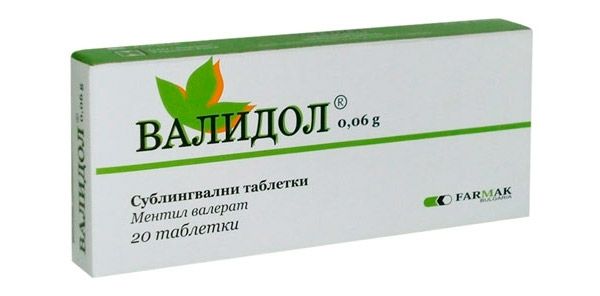
Indications for use of the drug:
- Ischemic heart disease.
- The occurrence of nausea and vomiting as a result of alcohol intoxication.
- Increased nervousness, hysteria.
Methods of use and dosage:
Validol is available in tablet form (0.06 g) and as a solution. It is used sublingually - 1 tablet of validol is placed under the tongue. You can also use a solution (5-6 drops). Due to this method of application, the pharmacological effect develops quite quickly.
Storage conditions:
Storage temperature - 20 degrees. If validol is stored as a solution, the vials must be hermetically sealed.
Metoclopramide (Cerucal)
Pharmacodynamics:
This drug has an antiemetic and antihiccup effect, activates the motor activity of the gastrointestinal tract. By blocking central and peripheral D2-dopamine receptors, it has an antiemetic effect. It has a beneficial effect on the functional efficiency of the digestive tract.
Indications for use:
- Vomiting, nausea of various origins, with the exception of vestibular etiology.
- Acute and chronic stages of diseases of organs involved in digestion processes: flatulence, GERD, biliary dyskinesia.
- Headache.
- Diagnostic studies.
Methods of administration and therapeutic doses:
This medicine is intended for both internal and parenteral use.
Internal use: 1 tablet 3 times a day 15-20 minutes before meals.
Parenteral administration: 1 ampoule 2 times a day.
For diagnostic studies: 2 ampoules of metoclopramide (20 mg) are administered intravenously. 30 mg of the drug is taken orally 20 minutes before the start of the procedure.
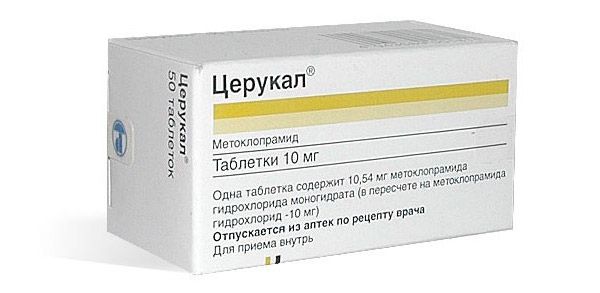
Side effects of the drug:
Occur extremely rarely. Sometimes a state of drowsiness may be felt. For this reason, it should be taken with caution by people who are engaged in activities that require maximum concentration. Carcinogenic and mutagenic effects have been proven.
Metoclopramide should be stored in a dry, dark place. Keep out of reach of children.
Pills for alcohol poisoning help to cope with the hangover condition only. In case of acute intoxication, first you need to bring the person out of the state of intoxication - wash the stomach or induce vomiting artificially. Only after this can you connect medications. In case of constant and long-term use of alcoholic beverages (chronic alcoholism), you should contact a narcologist. The best option is not to get carried away with alcoholic beverages. Then pills for alcohol poisoning will not be needed, as well as visits to the doctor. Good health to you!
Attention!
To simplify the perception of information, this instruction for use of the drug "Alcohol poisoning pills" translated and presented in a special form on the basis of the official instructions for medical use of the drug. Before use read the annotation that came directly to medicines.
Description provided for informational purposes and is not a guide to self-healing. The need for this drug, the purpose of the treatment regimen, methods and dose of the drug is determined solely by the attending physician. Self-medication is dangerous for your health.

